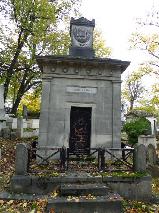Cambacérès, Jean Jacques Régis de, duc de Parma |
| STATESMAN, LAWYER (FRANCE) |
|
BORN 18 Oct 1753, Montpellier, Hérault - DIED 5 Mar 1824, Paris GRAVE LOCATION Paris: Père Lachaise, Rue du Repos 16 (division 39, chemin Camille Jordan, ligne 01 (Moiroux: O-32)) |
|
Jean-Jacques-Régis de Cambacérès was born into a noble family. His father was a future mayor of Montpellier. He studied law at the college d'Aix and worked as a councillor at the court of accounts and finances in Toulouse. He supported the French Revolution and represented Héraul during the National Convention of 1792. He was a moderate republican. He voted that Louis XVI was guilty but he stated that his penalty should be postponed because in his opinion the convention had no legal power to act as a court. After the fall of Robespierre he was a member of the Committee of Public Safety. He negotiated peace with Spain in 1795 and other countries. In 1799 he became Second Consul under Bonaparte and wrote a new civil law that together with the work of a commission of four lawyers would become the Napoleonic Code. Although he disapproved of the increasing personal power of Napoleon he continued to work wih him and held the positions of Arch-Chancellor of the Empire and President of the House of Peers. In 1808 Napoleon made him Duke of Parma. In 1814 he returned to private life but during the 100 days he served as minister of justice. He was a known homosexual and when he appointed a woman for a mission Napoleon joked 'my compliments, so you hace come closer to women?'. After the restoration he was exiled from France, but his opponision against the execution of Louis XVI resulted in the restoration of his civil rights in 1818. Because Marie-Louise had obtained the title Duchess of Parma he was now Duke de Cambacères. He lived in Paris until his death in 1824. Related persons • visited Hamelin, Fortunée • has a connection with Napoleon I Bonaparte |
| Images |
Sources • Winkler Prins Encyclopedie (editie 1909), 1909 • Jean-Jacques-Régis de Cambacérès - Wikipedia (EN) |



